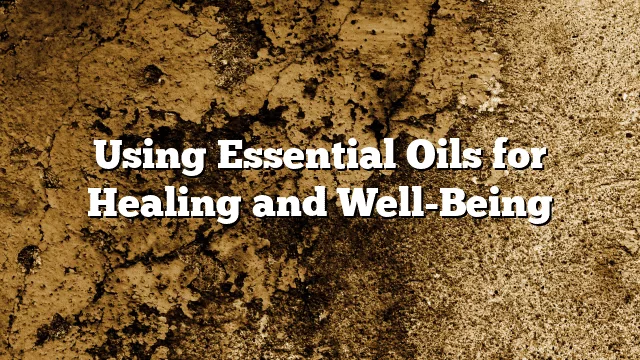
Aromatherapy is an alternative form of medicine that employs essential oils as natural remedies to promote overall wellbeing. These plant oils contain properties which may act as an antidepressant, stimulating, detoxifying, antibacterial and/or calming remedy and help alleviate various symptoms associated with different disorders or illnesses.
Essential oils can be inhaled, applied topically, or used together with massage therapy to provide health benefits. Professional aromatherapists, nurses, physical therapists and pharmacists have received training on using essential oils as medicine for your benefit.
Aromatherapy
Aromatherapy is a centuries-old complementary therapy practice which utilizes essential oils to promote physical and psychological well-being. Aromatherapy may stimulate brain cells while simultaneously helping manage feelings and moods.
Some individuals use essential oils to manage pain, anxiety and depression while others use them to help prevent illness and create a sense of calmness.
Aromatherapy offers many health advantages, and should always be performed under the supervision of a certified healthcare practitioner. They can educate on proper use and dilution of oils as well as suggest combinations which will work effectively.
Essential oils are typically safe to inhale or apply topically, however it’s always wise to read the label prior to purchasing any product to ensure you purchase one without additives or synthetic components.
Essential oils have long been recognized for their therapeutic benefits in relieving stress, alleviating depression and aiding sleep. Furthermore, essential oils may help soothe skin irritations like eczema or insect bites by inhalation.
Essential oils may have the power to impact blood pressure, making them unsuitable for people with high blood pressure. Furthermore, essential oils may cause liver or kidney dysfunction so those who already have existing conditions should consult with their physician prior to consuming these products.
Other essential oils may help pregnant women and post-operative patients overcome nausea and vomiting, with some studies suggesting these oils could also provide relief from colic in infants.
One of the easiest and most widespread forms of aromatherapy is diffusing essential oils into the air using a diffuser or spray bottle, either at home, at a spa, or with a massage therapist.
Topical application of aromatherapy is another effective form of aromatherapy, where essential oils can be diluted by mixing with carrier substances like coconut oil before being applied topically on the skin. Before employing this approach, always conduct a skin test first in case any adverse reactions arise from applying it directly.
No matter if you use essential oils for therapeutic or recreational purposes, it’s essential that you find a reputable aromatherapy company with several years of experience and an accessible website with details about their products and how best to use them safely.
Diffusers
Essential oil diffusers offer an effortless and affordable way to reap the benefits of aromatherapy. Available in an assortment of styles, they allow you to fill your home or office with relaxing scents from essential oils (depending on which ones you select).
Diffusers use evaporation – when moisture evaporates into the air – to disperse essential oil throughout a room, as well as emit negative ions which have been linked with improving mood and sleep quality.
Cacti are also an effective way to relax and unwind after a long day or during times of tension or insomnia, offering a natural alternative to candles or other fragranced products that contain harmful chemicals.
Diffusers can dramatically improve air quality, eliminating pollutants like formaldehyde and benzene that contribute to respiratory issues or cause irritation to the nose, throat and chest. They can also increase oxygen levels within your body for improved circulation and breathing.
Apart from their obvious health benefits, diffusers add style to any space by turning it into more of a spa-like environment. You could also incorporate them into your wellness routine – perhaps starting your day right with aromatherapy before heading out the door for work?
Diffusing essential oils is also used as a method for treating specific illnesses or ailments, including congestion, headaches and sinus infections as well as pain management. Certain essential oils may provide significant relief.
If you are suffering from an acute illness, diffused essential oils could provide much-needed relief, such as peppermint or eucalyptus blends. Vaporized essential oils also help reduce inflammation and boost immune systems – something especially valuable during cold and flu season.
Diffusers are an increasingly popular choice among those seeking to improve their wellbeing, for a variety of reasons. Before using one however, it is advisable to speak to your physician first about if using specific oils is right for you.
Topical application
When people use essential oils, their bodies absorb it through skin absorption and nasal passages; unlike inhaling diffused essential oil.
Topical application can be an effective way of healing and maintaining well-being, though not everyone may find this approach suitable. People with sensitive skin should avoid topical oils since these could trigger allergic reactions.
Keep in mind that certain essential oils may interact with medications and exacerbate health conditions in those using them, so before beginning any new treatment regime it is advised to seek professional advice first.
Some essential oils have been noted as having an antidepressant effect and can be used in aromatherapy to support mental health during times of difficulty or emotional turmoil. Lavender, ylang-ylang, rose and bergamot oils are among those said to provide such support.
Studies have demonstrated the therapeutic use of essential oils can ease both depression and anxiety while helping treat certain physical ailments. Bergamot and ginger essential oils may help promote circulation while relieving muscle aches. Clove, on the other hand, acts as an antispasmodic to reduce tension in legs and abdomen as well as acting as an effective diuretic against excessive water retention.
At times of stress or emotional distress, it can be beneficial to adopt a positive and constructive mindset and utilize healthy coping mechanisms such as exercise, meditation, journaling and phone calls with loved ones. Furthermore, pure essential oils applied topically may also provide benefits to improve overall mental health and well-being of an individual.
Inhalation
Aromatherapy uses essential oil inhalation as part of its healing and well-being treatments, helping reduce anxiety, improve sleep and relieve pain. Inhaling essential oils can be used as part of aromatherapy to aid in healing and wellness efforts.
Mack suggests inhalation of essential oils is beneficial for people dealing with various health concerns, and is generally safe if properly diluted.
Essential oils can be inhaled into the lungs to be absorbed directly into the bloodstream, or they can be applied topically and taken up through the skin via inhalation and nose absorption.
Essential oils possess numerous pharmacological effects, such as antibacterial, anti-inflammatory and antifungal actions. Essential oils can help alleviate pain relief, nausea and headache symptoms.
Inhalation therapy can be an invaluable aid to respiratory conditions like asthma, bronchitis or chronic obstructive pulmonary disease (COPD). Breathing exercises and humidifier use may also aid lung function by raising oxygen levels in blood and decreasing carbon dioxide in airways.
Lungs are soft organs in our chest that take oxygen from the air we breath into our bloodstream when we inhale, then release carbon dioxide and other waste gases when exhaling.
Lungs play an essential role in maintaining proper body functioning. Their job, known as gas exchange, allows us to breathe air and support life on Earth.
Your lungs are located in your chest and consist of two sections; right and left sides. Of these sides, right side has larger, deeper cavities than left which allows it to hold more air while left side has smaller cavities that store air more efficiently.
Breathing is an automatic and natural process that takes place without conscious thought, helping our bodies survive and flourish. Breathing involves contracting muscles that surround your lungs to allow air into them as well as expanding and contracting of your diaphragm.
Inhalation of essential oils can be used as an effective means to address several respiratory conditions, including allergies, asthma, COPD, emphysema and lung infections. Furthermore, essential oil inhalation has also proven useful in relieving symptoms related to fatigue, headaches and digestive disorders.
